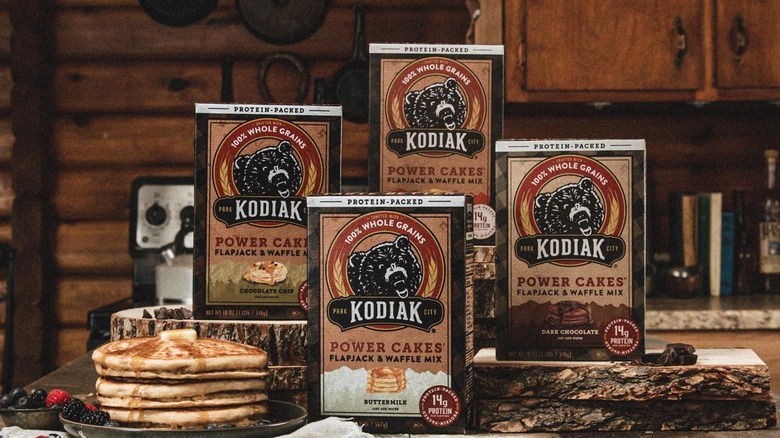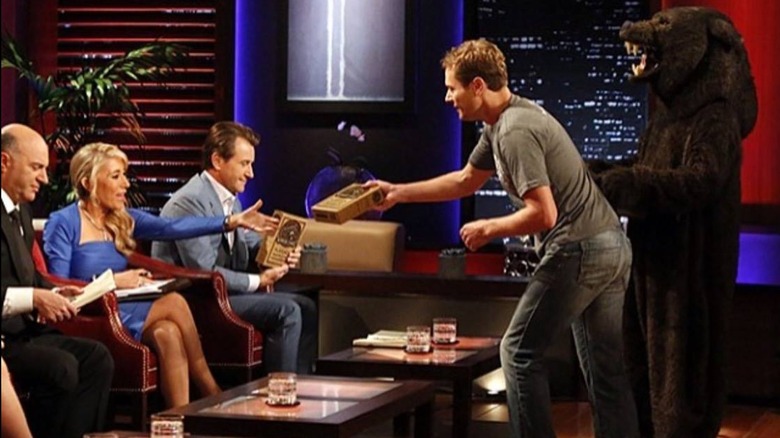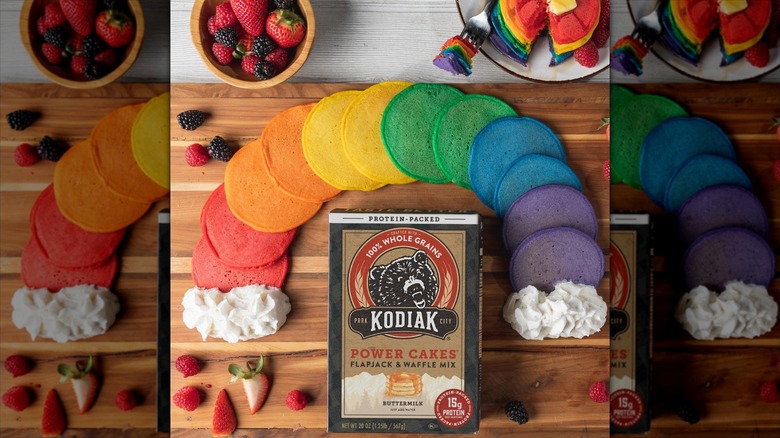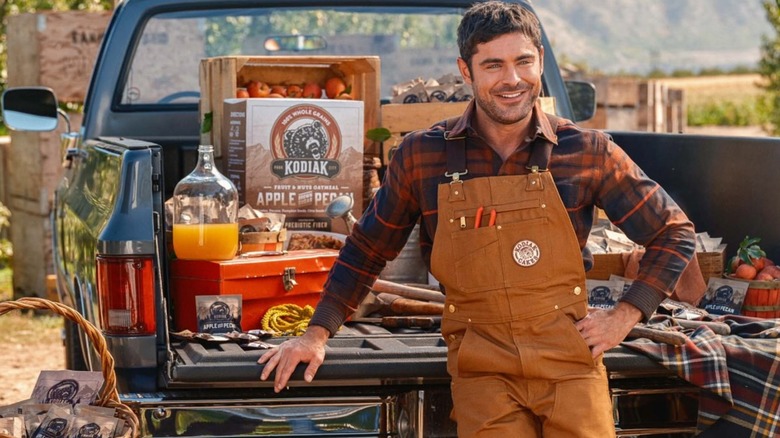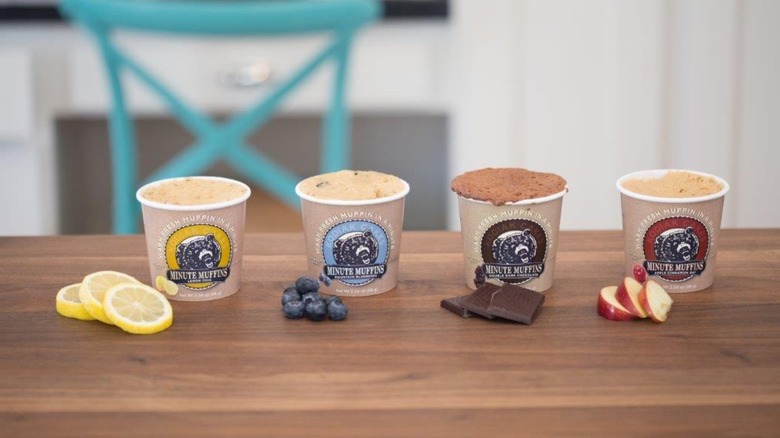Kodiak Cakes: Here's What Happened After Appearing On Shark Tank
For Joel Clark, whole wheat pancakes started as a family affair. When he was eight years old, his mother loaded up his wagon with paper bags of her homemade flapjack powder, hand-wrote cooking instructions, and sent Joel door-to-door to sell them. Every completely empty wagon at the end of the day reinforced his passion for pancakes. As an adult, Clark deemed his own pancake company Kodiak, a name meant to evoke rustic, tough imagery. The conceit behind Kodiak Cakes was that the mix needed only water to make the batter for delicious pancakes and waffles — although we have learned that leftover Champagne has its uses in fluffy pancakes as well!
After successfully launching Kodiak at a few local retailers, in 2009 Clark teamed up with University of Utah grad Cameron Smith to help Kodiak develop a marketing strategy. Quickly, Smith got hold of buyers from Target and arranged a meeting and taste test. It may seem like pancakes always taste better at a restaurant, but Target's reps really liked the Kodiak Cakes and launched the product nationwide. Kodiak was on the grow. It took Clark's father tapping into his home equity but, by 2013, Kodiak had racked up sales of $3.5 million. As is the case with so many fast-growing businesses, however, there just wasn't enough money to keep fueling the fires of expansion. Clark and Smith decided to take a dive into the "Shark Tank" on the hunt for an investor.
What happened to Kodiak Cakes on Shark Tank?
Clark and Smith appeared on Season 5, Episode 28 of "Shark Tank" armed with an animatronic, roaring bear, and samples of their whole wheat flapjack mix and fruity pancake syrup — which, while made with real fruit and no added sugar, was not real (really expensive) maple syrup. They made their ask: $500,000 in exchange for 10% equity in the company.
Right away, Kevin O'Leary was skeptical of the Kodiak duo's goals to grow the company to a $20 million blockbuster within four years. He brutally eviscerated their assessment of Kodiak's valuation and implied that the pancakes were a flash in the (griddle) pan. His offer: $500,000 in exchange for a whopping 50% of the company. Robert Herjavec said that he loved the product, but believed investing would be a big risk, so he offered $500,000 for 35%. Barbara Corcoran would only front half the money for 20%, stating that another shark would have to be involved.
Lori Greiner demurred, saying that she wasn't a pancake fan. Mark Cuban also declined to get involved, stating that Kodiak Cakes was a great business, but he predicted that coming challenges were just too daunting to tackle. Ultimately, just like Atlas Monroe, which struck out its "Shark Tank" appearance, Kodiak Cakes went home sans deal. Yet it would prove to be a rare misstep on the sharks' part that likely still haunts them today.
Kodiak Cakes after Shark Tank
Not willing to be cowed by the sharks' lack of faith, Clark and Smith persevered. In 2014, the same year that its episode of "Shark Tank" aired, buoyed by the so-called "Shark Tank effect" where featured businesses see a spike in sales, Kodiak Cakes launched its Protein Power Cakes mix, a nutrient-dense pancake mix that absolutely exploded in popularity, knocking heavyweight competitors Aunt Jemima (now the Pearl Milling Company) and Bisquick off their pedestals as the best-selling boxed pancakes at Target.
Between 2013 and 2014, Kodiak Cakes' sales jumped from $3.6 million to $6.7 million. Encouraged by the warm reception from customers, Clark and Smith expanded the company's product line, incorporating frozen pancakes and waffles, along with muffin mixes. Their retail partner network was expanding, too: Kodiak Cakes were now being carried in Whole Foods and Costco. The focus of the company had pivoted, with smart market research realizing that healthier products were the key to millennial customers' hearts. Accordingly, Kodiak Cakes aligned itself with trends, really punching up the health bonafides of its protein-infused products. The viral TikTok scrambled pancakes may be a crime against humanity (depending on who you ask), but Kodiak breakfast treats carry a shining halo of perceived virtuousness, a promise of a diner-worthy stack of flapjacks that you can spread with the best butter brand at the grocery store and still feel good about consuming.
Is Kodiak Cakes still in business?
To determine how Kodiak Cakes is currently doing, all you have to do is head to your local grocery store. it doesn't matter which one ... Kodiak Cakes will almost certainly be there, with a robust line-up of baking mixes, granola bars, oatmeal packets, just-add-water Kodiak Cups, and, of course, the pancake mixes and frozen waffles that made it famous. A luminary stable of celebrities endorse the brand, including Chief Brand Officer Zac Efron. Travis Kelce has publicly commented on his love for Kodiak Cakes, and even donated 25,000 of its meals to schoolchildren in Kansas City, Missouri. Turns out that celebrities don't just have a favorite McDonald's order; they also enjoy protein sweets just like normal folk.
In 2019, Clark and Smith sold majority interest in Kodiak Cakes to a private equity firm, L Catterton, which invests in popular brands like Cholula hot sauce, The Honest Company, and Sweet Leaf Tea. Terms of the deal were officially undisclosed, but online whispers suggest that Clark and Smith netted somewhere in the ballpark of $800 million on the sale. Products like SubSafe have become modest hits after appearing on "Shark Tank," but Kodiak Cakes features among a small handful of blockbuster household names that have found triumph post-Tank despite the sharks turning up their snouts at them. Clark told Kiplinger in 2019 that he was glad he didn't give in and take a Shark Tank deal. Looks like he was right to hold out.
What's next for Kodiak Cakes?
On the list of expert ways to amp up your pancakes, adding protein powder probably isn't one that you would have thought of instinctively, but Joel Clark and Cameron Smith spun straw into gold with little more than an heirloom flapjack recipe and a vision of selling a better breakfast. In 2025, revenue was on track to hit $200 million, making Kodiak one of the fastest-growing food brands in the world.
As it moves into the future, it's expected that Kodiak Cakes will continue on the same path it has carved out in the more than 12 years since it bombed out of "Shark Tank" to become a grocery store legend: embracing healthy, delicious food and the same rugged outdoorsy spirit that inspired its branding. The brand has actively supported conservationist missions and put its money where its heart is, partnering with projects to plant trees and keep wild spaces intact. The Kodiak Cakes catalog currently encompasses over 80 products and is sold coast-to-coast in the United States. With no signs of slowing down, we predict more for Kodiak: more products, more growth, more good work. Kodiak Cakes may have failed to swim with the sharks, but perhaps that was the best thing for its development in the long run.
